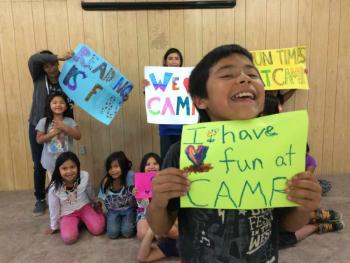Beginning in July, Frontier College will offer free literacy camps to more than 8,000 children ages five to 15 years old in more than 140 Indigenous communities in British Columbia, Alberta, Saskatchewan, Manitoba, Ontario, Quebec, New Brunswick, Labrador, Yukon, and Nunavut.
The camps were first started in Northern Ontario more than a decade ago in an effort to reduce summer learning loss, which can occur if children do not use their reading and writing skills during the summer months of school break.
It’s recommended that young students should read for a minimum of 15 minutes a day and older students should read five or more books over the summer.
Frontier College began offering Summer Literacy Camps in Indigenous communities in 2005, following the vision of former Lieutenant Governor of Ontario, James K. Bartleman, a member of the Chippewas of Mnjikaning First Nation.
The camps employ about 350 young adults, many of whom are hired from the host communities. With the support of camp counsellors, Elders, parents, and community members, campers will expand their vocabularies and increase their love of reading through storytelling, group reading, arts and crafts, writing, and field trips.
Frontier College will distribute more than 25,000 new books to campers and communities this summer.
“We know how important it is to keep kids learning during the summer months, to ensure they return to school confident and ready to succeed in the school year ahead,” said Stephen Faul, president and CEO, Frontier College. “Working in partnership with Indigenous communities, Frontier College is proud to play a part in building literacy and numeracy skills among children and youth across Canada.”
“Many of our students take advantage of camp every summer and benefit from it in terms of enhancing their reading as well as cultivating their enquiring minds,” said Bill Sainnawap, director of Education at Kitchenuhmaykoosib Inninuwug in Ontario. “The camp is a valued complement to our education programming.”
TD Bank Group is a lead national supporter, and the camp program is funded by governments, corporate donors, foundations, public sector unions and institutions, and Indigenous communities.
For more information about the camps, go to https://www.frontiercollege.ca/

